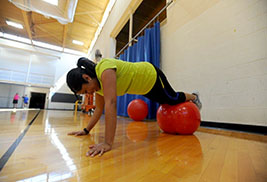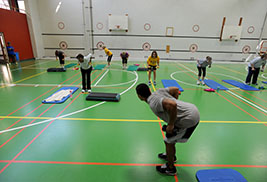Kent State’s Department of Exercise Physiology presents research findings at national meeting
 Researchers in Kent State University’s Department of Exercise Physiology are reporting positive results from the 12-week Kent State Faculty/Staff Exercise Program that launched in July 2013. Their findings were presented at the American College of Sports Medicine’s annual meeting from May 27-June 1 in Orlando, Florida. Research into the exercise program that was designed specifically for faculty and staff at Kent State looked at how participants changed physically and mentally over time.
Researchers in Kent State University’s Department of Exercise Physiology are reporting positive results from the 12-week Kent State Faculty/Staff Exercise Program that launched in July 2013. Their findings were presented at the American College of Sports Medicine’s annual meeting from May 27-June 1 in Orlando, Florida. Research into the exercise program that was designed specifically for faculty and staff at Kent State looked at how participants changed physically and mentally over time.
The research was led by Ellen Glickman, Ph.D., professor and program coordinator of the Exercise Physiology program, and she was assisted by five graduate students in the department.
Participants in the program used MOVbands, which are activity monitors, to track their progress throughout the exercise program. MOVbands use convenient online software and allow users to log on, look at the group name to see individuals’ numbers and see on their own how personally active they are. The software allows users to see the activity of other participants who are assigned numbers so that they are not identifiable and can maintain anonymity.
 “We use MOVbands in order to have participants take 10,000 steps per day,” says Glickman. “Just participation alone and engaging in activity, regardless of how active you were, significantly changed variables.”
“We use MOVbands in order to have participants take 10,000 steps per day,” says Glickman. “Just participation alone and engaging in activity, regardless of how active you were, significantly changed variables.”
At the beginning of the program, Glickman and her students measured the participants’ baseline body fat and mood states. Depression and stress were mild to moderately elevated. About four weeks into the program, participants were measured again and their levels were in the normal range. John Gunstad, Ph.D., associate professor in Kent State’s Department of Psychology, also partnered with the researchers to help with this effort.
“You usually need about six months to see these psychological changes; but we had immediate impact, and that’s a big factor,” saysDuane Corbett, one of the graduate students who helped with the research.
Corbett did his dissertation on this research and presented it at the American College of Sports Medicine meeting in many different forms, such as abstracts and publications.
By the end of 10 weeks, the 107 participants had significantly reduced body weight and a reduction in anxiety and depression. They also slept better and felt better about themselves in general.
“Outside of the research, one of the biggest things is the opportunity the program created,” says Corbett. “It’s not just for faculty and staff to come exercise, but for the students as well to have hands-on experience here at the university instead of going somewhere else. Therefore, everyone involved benefits from it.”
Glickman agrees. “The program is a scholarship of application and discovery,” she says. “The faculty and staff have loved coming to class, and the students have a symbiotic relationship with them. I believe in exercise and exercise is medicine.”
The Faculty/Staff Exercise Program is sponsored by the Division of Human Resources in collaboration with the School of Health Science.
Find more information about the Faculty/Staff Exercise Program.
For more information about the American College of Sports Medicine meeting and the research conducted by Glickman and her students, visit http://blog.movable.com/exercise-as-medicine/.
